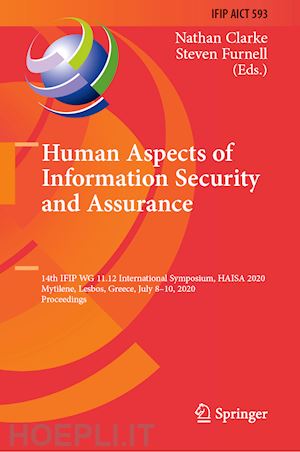
Questo prodotto usufruisce delle SPEDIZIONI GRATIS
selezionando l'opzione Corriere Veloce in fase di ordine.
Pagabile anche con Carta della cultura giovani e del merito, 18App Bonus Cultura e Carta del Docente
This book constitutes the proceedings of the 14th IFIP WG 11.12 International Symposium on Human Aspects of Information Security and Assurance, HAISA 2020, held in Mytilene, Lesbos, Greece, in July 2020.*
The 27 full papers presented in this volume were carefully reviewed and selected from 43 submissions. They are organized in the following topical sections: privacy and COVID-19; awareness and training; social engineering; security behavior; education; end-user security; usable security; security policy; and attitudes and perceptions.
*The symposium was held virtually due to the COVID-19 pandemic.
Privacy and COVID-19.- Australian Attitudes Towards Privacy of Information: Will COVID-19 Make a Difference?.- Concern for Information Privacy: A Cross-Nation Study of the United Kingdom and South Africa.- A review of information security aspects of the emerging covid19 contact tracing mobile phone applications.- Awareness and Training.- Towards a Cross-Cultural Education Framework for Online Safety Awareness.- A heuristic point of view of cybersecurity and online safety pedagogy.- Context Based Micro Training: A Framework for Information Security Training.- Social Engineering.- Employees’ Ambition for Professional Advancement on LinkedIn Increases Susceptibility to Cyber-Social Engineering: An Empirical Test.- Does ubuntu influence social engineering susceptibility?.- Quantifying Susceptibility to Spear Phishing in a High School Environment Using Signal Detection Theory.- Security Behaviour.- Kids Doodle Pass: An Exploratory Study of an Authentication Mechanism for Young Children.- Information security behavioural threshold analysis in practice: An implementation framework.- Information security behaviour: Development of a measurement instrument based on the self-determination theory.- Education.- Addressing SME Characteristics for Designing Information Security Maturity Models.- Cyber Security Education and Training: Delivering industry relevant education and skills via Degree Apprenticeships.- Internet Self-Regulation in Higher Education: A Metacognitive approach to Internet Addiction.- End-User Security.- Evaluation of User App Choices in the Presence of Risk Communication on Android Devices.- Exploring Information Security and Domestic Equality.- Responding to KRACK: Wi-Fi Security Awareness in Private Households.- Usable Security.- Exploring the meaning of "usable security".- Dyslexia and Password Usage: Accessibility in Authentication Design.- Securing User eXperience (SUX): A Review For the End-Users’ Software Robustness.- Security Policy.- SMEs’ Confidentiality Concerns for Security Information Sharing.- Validation of an information privacy perception instrument at a Zimbabwean university.- Are We Really Informed on the Rights GDPR Guarantees?.- Attitudes and Perceptions.- “Most Companies Share Whatever They Can to Make Money!”: Comparing User's Perceptions with the Data Practices of IoT Devices.- Analysis of the ‘Open Source Internet Research Tool’: A Usage Perspective from UK Law Enforcement.- Critical analysis of Information Security Culture Definitions.











Il sito utilizza cookie ed altri strumenti di tracciamento che raccolgono informazioni dal dispositivo dell’utente. Oltre ai cookie tecnici ed analitici aggregati, strettamente necessari per il funzionamento di questo sito web, previo consenso dell’utente possono essere installati cookie di profilazione e marketing e cookie dei social media. Cliccando su “Accetto tutti i cookie” saranno attivate tutte le categorie di cookie. Per accettare solo deterninate categorie di cookie, cliccare invece su “Impostazioni cookie”. Chiudendo il banner o continuando a navigare saranno installati solo cookie tecnici. Per maggiori dettagli, consultare la Cookie Policy.